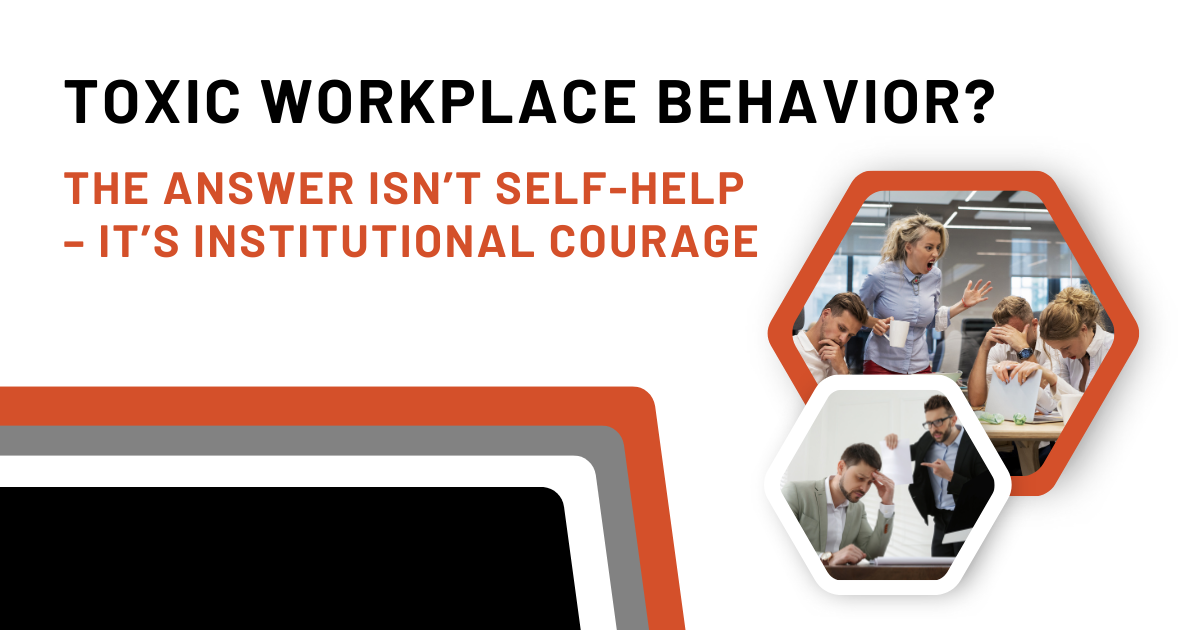Resources > Blog > Toxic Workplace Behavior? The Answer isn’t Self-Help – it’s Institutional Courage

In every workplace, there is one staff member, leader or customer who causes anxiety, frustration and fear in others with their counterproductive workplace behavior. Even the simplest changes and decisions are communicated with trepidation given this person’s unpredictable reactions and personal attacks on those with whom they disagree. Leaders and staff alike spend their personal time reflecting on what this person did “yesterday” and are even more concerned about what they are going to do “tomorrow”.
While it’s often worse when this person has and abuses their organizational power, leaders are not exclusively to blame for this type of behavior: staff, contractors, members of the public and others also engage in unpredictable, explosive and aggressive communication and conduct, resulting in significant personal and organizational harm.
I hear about these individuals constantly. They take over boardrooms and lunchrooms with their “passionate” (read: aggressive) opinions on everything from the “new hire” to upcoming elections. They interrupt and speak over others, they retaliate against those who question, disagree with or challenge them, and they silence dissent through exclusion, intimidation, malicious gossip and outright cancellation. This toxic and counterproductive workplace behavior is a pervasive issue that destroys morale and undermines productivity.
I titled my latest book “Walking on Eggshells?” because this is how people describe having to cope with this type of person. It is truly remarkable how one person’s behavior has the ability to control and destroy the work environment and the psychological health of those within it.
Those who engage in this disruption are the “worst kept secret” in every organization. People know who they are – and the damage they cause. What no one knows or understands is why they are allowed to get away with it.
Many self-help resources have been developed on how to “cope” with these behaviors. “Set your boundaries”; “Rise above it”; “Let it Be Your teacher”. While this advice is well-intentioned and perhaps necessary in a world that lacks accountability and consequences, it is at best a band-aid, not an equitable or permanent remedy.
The meaningful answer lies in taking steps to ensure the disruptive, controlling and aggressive behavior ends. It takes institutional courage to hold accountable those who cause the suffering, not a list of positive affirmations for those forced to experience it.
I’m not saying this is easy. Given how reactive these folks are to straightforward operational decisions, one can imagine their aggressive response when challenged on their own behavior. Their best defense is often a scary offense which includes threatening others, filing multiple unfounded complaints, public shaming, and otherwise.
It’s also complicated because many who engage in this behavior have never been held accountable. As a result, when a leader tries to take action, it is the leader who is viewed as being difficult and unreasonable. After all, if a behavior has been tolerated for years, why is today any different?
It’s different because engaging in – and excusing – inexcusable behavior is now illegal. Plain and simple. Those who engage in aggressive, unpredictable and psychologically unsafe behavior are acting against the law, along with those who condone their behavior by looking the other way.
At times, the behavior is excused because of the person’s troubling circumstances (past or present) that are said to have impacted and influenced their behavior. “They’ve gone through so much”; or “They’re having a rough time”. That may be true but their suffering is not a lawful or justifiable reason to cause suffering in those around them.
The answer – while not simple – is straightforward. What we must do is impose consequences with compassion, an approach that I call “respectful accountability”. There must be institutional courage to do the right thing – that is, hold people accountable but in the right way – that is, in a manner that preserves their dignity and integrity and helps support them through whatever struggles are continuing to impact their ability to function and interact constructively.
For respectful accountability to be sustainable and credible, it must be applied to everyone in the workplace, regardless of position, popularity, personality or seniority. “But that’s so and so” is code for allowing exceptions to the norm; and such exceptions are no longer defensible.
Supports for ending disruptive, costly and harmful workplace dysfunction must be transferred out of “self-help” and into the business section of your workplace culture (and local bookstore). We must stop making this about how to cope with such behavior and instead, begin imposing defensible consequences on those who engage in it.
Please get in touch with me at [email protected] if you have any questions about how to properly address toxic counterproductive workplace behavior at an organizational level.
Click here to read more blogs about building respect in your workplace.
